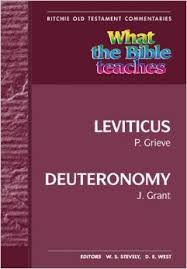
"Leviticus by P Grieve.The message of the book of Leviticus is two fold: the possibility of access to God, and the necessity of living a holy life before God. These two great subjects are inseparably intertwined, for God is holy and only those who are holy in life can have access to His presence.
The instructions given to the Children Of Israel were specifically related to their life in the wilderness, but also anticipated life in the land of Canaan to which they were journeying.
The principles enshrined in the commandments given have not been abrogated. God is still the holy God He always was, and man is still as sinful as ever. It is still God's desire that sinful man should approach Him, and so the necessity of man's sin being dealt with to make this possible is as vital today as it was in the days of Moses.
Deuteronomy by J Grant. The emphasis in the book of Deuteronomy is not so much on the ceremonial law, but on its moral and social tenets. The existing laws are restated, some are added and some are expanded, to take into account the new circumstances which would exist when the nation possessed the Land. The reading of Deuteronomy gives a fuller understanding of some of the events recorded in the preceding books, and the expansion of the terms of the covenant teaches the reader principles for the enjoyment of that of which the ""Land"" speaks, the spiritual blessings in the heavenlies bestowed on Christians today (Eph 1.3). Those who ignore this book will leave undiscovered much that is for spiritual profit today."
The instructions given to the Children Of Israel were specifically related to their life in the wilderness, but also anticipated life in the land of Canaan to which they were journeying.
The principles enshrined in the commandments given have not been abrogated. God is still the holy God He always was, and man is still as sinful as ever. It is still God's desire that sinful man should approach Him, and so the necessity of man's sin being dealt with to make this possible is as vital today as it was in the days of Moses.
Deuteronomy by J Grant. The emphasis in the book of Deuteronomy is not so much on the ceremonial law, but on its moral and social tenets. The existing laws are restated, some are added and some are expanded, to take into account the new circumstances which would exist when the nation possessed the Land. The reading of Deuteronomy gives a fuller understanding of some of the events recorded in the preceding books, and the expansion of the terms of the covenant teaches the reader principles for the enjoyment of that of which the ""Land"" speaks, the spiritual blessings in the heavenlies bestowed on Christians today (Eph 1.3). Those who ignore this book will leave undiscovered much that is for spiritual profit today."



